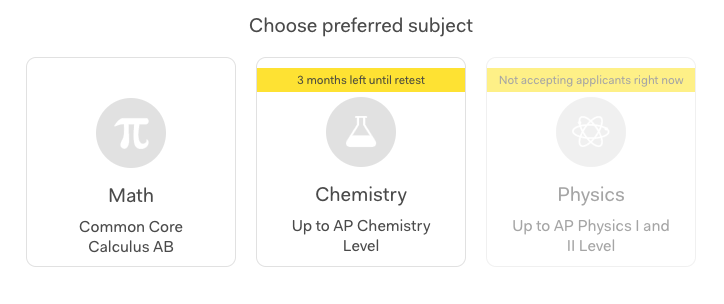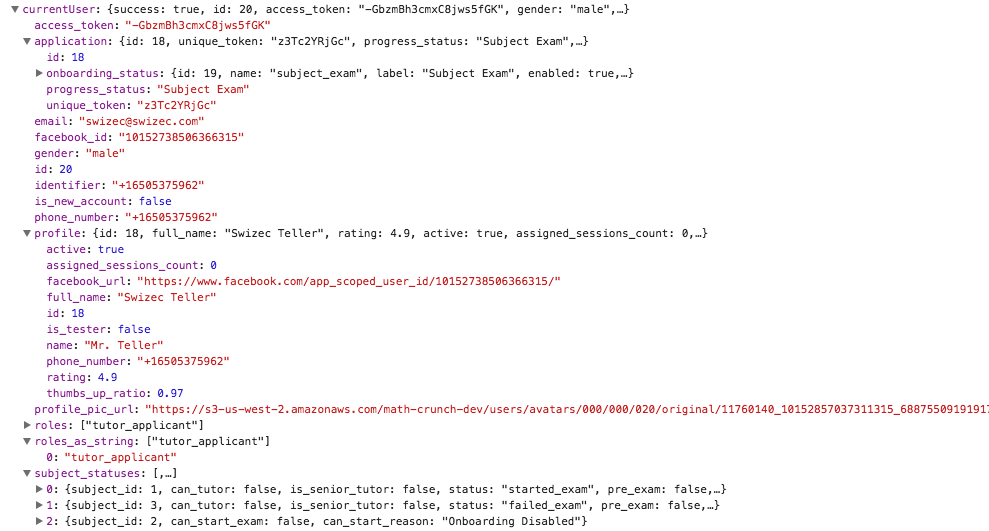Let's take an example from my day job. An onboarding step for new tutors is a subject exam. It starts with this page:

In this case, the applicant has already flunked chemistry, we're not accepting physics, and they can still take a math exam. To build this, we need data about the current user, about the subjects, and how they relate to each other.
Basic API-backed MobX model
Building a basic model with MobX is straightforward once you discover extendObservable. It's a store that gets its properties from the API.
A User model might look like this:
class User {
constructor(mainStore, id) {
this.mainStore = mainStore;
this.id = id;
this.fetchFromAPI();
}
@computed get url() {
return `/api/users/${id}`;
}
@action fetchFromAPI() {
fetch(this.url)
.then((response) => response.json())
.then(
action("set-user-params", (json) => {
extendObservable(json);
})
);
}
}
The constructor takes a user id and a mainStore reference. Having that reference to a parent store is often useful when spelunking through your data model. I learned that the hard way ?
We call fetchFromAPI to fetch the user data, use a url computed value for the URL, and naively use extendObservable to set all the API data as observables on our User model.
This approach embraces duck typing. There's no advance declaration of what a user model looks like. No description of properties, nothing you can rely on just by looking at the code. You're just gonna have to try to access a property and hope it works.
But when your model looks like this:

Do you really want to type all of that out? No, you don't.
extendObservable is a convenient approach for these situations. It gives you infinite flexibility and makes properties deeply observable.
That means using things like user.subject_statuses[0].can_start_exam Just Works™. You should be careful about undefineds, though. Until the API call goes through, anything beyond user. is undefined. That part is annoying.
Sidenote:
You can fake a maybe monad in MobX using when, like this:
when(() => user.subject_statuses,
() => // do stuff with data)

Connecting models is where things get awkward
Let's have a mainStore that looks a lot like the User model above. It may look like the User model, but it fetches a bunch of things about the environment, one of which is the current user's id, another of which is a list of subjects.
const MainStore {
@observable currentUser = null;
constructor() {
fetch('/api/environment_data')
.then(response => response.json())
.then(this.setData);
}
@action setData(json) {
this.currentUser = new User(this, json.currentUser.id);
delete json.currentUser;
extendObservable(this, json);
}
}
Whoa, did you see that? We fetched data, took the currentUser.id, then deleted currentUser before using extendObservable. Wat.
The API returns an object with many properties. In our example, let's assume it looks like this:
{
currentUser: {
id: N,
// other stuff, maybe
},
subjects: [
{id: N, name: 'Math'},
{id: N, name: 'Chemistry'},
// ...
]
}
We want to avoid writing a bunch of boilerplate, so we use the extendObservable trick to set everything. But we don't want to overwrite our custom currentUser, which is a proper MobX model, not just an observable.
So we have to delete that part of the data before extending. Awkward.
And why do we want User to be more than just an observable? Because it's going to need @computed values. We might re-fetch the model at random points or perform many actions that save stuff to the backend, change frontend state, and so on.
Dealing with all of that in MainStore would get hairy fast.
You're right. From the perspective of this example, that's a total YAGNI - ya ain't gonna need it. But bear with me.
Add the domain logic, increase the awkward
Using the above MainStore, rendering a subject picker is straight forward. Loop through observable list of subjects, render elements. If something changes, MobX takes care of it.
Not that the number or naming of subjects ever changes.
const SubjectPicker = inject('mainStore')(observer(({ mainStore }) => {
if (mainStore.subjects) {
return (
<div>
{mainStore.subjects.map((s, i) =>
<subject subject={s} key={i}>
)}
</subject></div>
);
} else {
return null;
}
}));
Assume we put an instance of MainStore in a ``as mainStore. That gives us global access via inject and cleans up our codebase.
A simplified ``component would look like this:
const Subject = observer(({ subject }) => (
<div>
<h3>{subject.name}</h3>
{subject.userStatus.can_start_exam ? "Go for it" : "LoL Nope."}
</div>
));
Not as pretty as the screenshot, but all that HTML and styling is irrelevant right now, so I took it out. Ours renders the subject name in an h3 tag, and a string Go for it if you can take this exam or LoL Nope if you can't.
Now, the trouble; can you see it?
It's that subject.userStatus.can_start_exam bit. You see, we've found ourselves staring at a piece of data that lies between concepts.
Ask a subject if it's startable and it needs to know who you're asking about. Ask a user and it needs to know which subject you're asking about. It smells like a computable value, but where?
Computables can't take arguments.
So even though the User model has this data – stored in subject_statuses – we can't put the computed there. It can't go in MainStore either because that too would require arguments.
"Dude, it's called a method. Just use a method", right?
Yes, methods and functions can take arguments. But MobX computeds are preferable because they automagically observe values, memoize their results, and so on. Cleaner code. Faster code.
We need a new Subject model that knows about currentUser. It looks like this:
class Subject {
@observable currentUser = null;
constructor(currentUser, data) {
this.currentUser = currentUser;
extendObservable(this, data);
}
@computed get userStatus() {
return this.currentUser.subject_statuses.find(
(s) => this.id === s.subject_id
);
}
}
It takes a reference to currentUser and raw data about itself then uses extendObservable to set it all up. We've added a computed userStatus method that goes to currentUser and finds the correct data.
This part is awkward, too. A model that returns information from a different model? Wat.
I'm not sure. Maybe it's dumb. Maybe I'm dumb. I think it makes sense.
Anyway, in MainStore, we now do something like this:
@action setData(json) {
this.currentUser = new User(this, json.currentUser.id);
delete json.currentUser;
this.subjects = json.subjects.map(
s => new Subject(this.currentUser, s)
);
delete json.subjects;
extendObservable(this, json);
}
Not very elegant, is it? And I think the subjects array stopped being observable in the process, so we have to add it as an @observable property explicitly.
Conclusion
- Use
extendObservableto load and create large models - Create new models when submodels need
@actions or@computeds - Do the
new Modelthendeletedance when that happens
It would be nice if extendObservable could do this for us. I'm sure it's possible as long as model constructors are forced to follow a common pattern.
But maybe that exists already and I don't know about it? Would def be a fun opensource project. ?
Continue reading about One awkward thing about MobX: Complex models
Semantically similar articles hand-picked by GPT-4
- How to structure your MobX app for the real world
- Livecoding #25: Adding MobX to a vanilla React project
- Simple MobX-driven modals
- Backbone → React: it's a people problem after all ?
- How to populate react-redux-form with dynamic default values
Learned something new?
Read more Software Engineering Lessons from Production
I write articles with real insight into the career and skills of a modern software engineer. "Raw and honest from the heart!" as one reader described them. Fueled by lessons learned over 20 years of building production code for side-projects, small businesses, and hyper growth startups. Both successful and not.
Subscribe below 👇
Software Engineering Lessons from Production
Join Swizec's Newsletter and get insightful emails 💌 on mindsets, tactics, and technical skills for your career. Real lessons from building production software. No bullshit.
"Man, love your simple writing! Yours is the only newsletter I open and only blog that I give a fuck to read & scroll till the end. And wow always take away lessons with me. Inspiring! And very relatable. 👌"
Have a burning question that you think I can answer? Hit me up on twitter and I'll do my best.
Who am I and who do I help? I'm Swizec Teller and I turn coders into engineers with "Raw and honest from the heart!" writing. No bullshit. Real insights into the career and skills of a modern software engineer.
Want to become a true senior engineer? Take ownership, have autonomy, and be a force multiplier on your team. The Senior Engineer Mindset ebook can help 👉 swizec.com/senior-mindset. These are the shifts in mindset that unlocked my career.
Curious about Serverless and the modern backend? Check out Serverless Handbook, for frontend engineers 👉 ServerlessHandbook.dev
Want to Stop copy pasting D3 examples and create data visualizations of your own? Learn how to build scalable dataviz React components your whole team can understand with React for Data Visualization
Want to get my best emails on JavaScript, React, Serverless, Fullstack Web, or Indie Hacking? Check out swizec.com/collections
Did someone amazing share this letter with you? Wonderful! You can sign up for my weekly letters for software engineers on their path to greatness, here: swizec.com/blog
Want to brush up on your modern JavaScript syntax? Check out my interactive cheatsheet: es6cheatsheet.com
By the way, just in case no one has told you it yet today: I love and appreciate you for who you are ❤️

